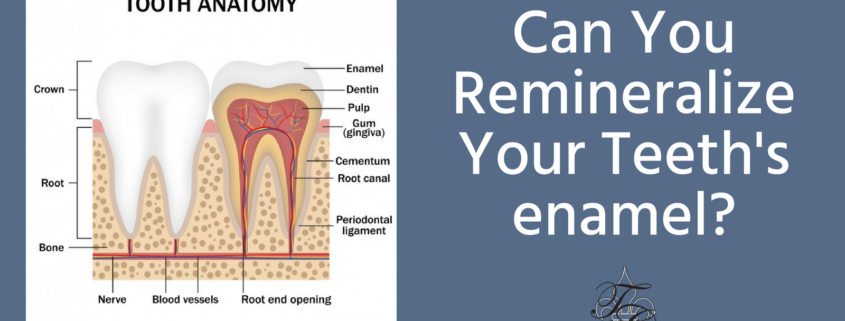Can You Remineralize Teeth’s enamel
If you’ve had issues with your teeth that involve weakening, white spots, or numerous cavities, one of the key causes could be demineralized enamel.
Tooth enamel is a dense mineral that surrounds the crown of every tooth. Think of this enamel as the moat and your tooth as the castle. Just as a moat protects the castle from unwanted invaders, tooth enamel protects the tooth from foreign substances that can hurt it, such as sugar and acid.
Tooth enamel has a number of distinctive features:
- It’s the hardest substance in the body
- It measures just a couple millimeters at its thickest
- It can be yellow, grayish, white or bluish
Since enamel is a mineral, it does not grow back. When it has been damaged, such as a crack or a chip, that loss becomes permanent. As hard as tooth enamel is, it can sustain a lot of damage, and erosion ranks as the most common type of tooth enamel damage.
What Causes Enamel Loss?
Acid ranks as the main cause of tooth enamel loss. This substance eats away at tooth enamel, eroding it over time. This leaves the tooth vulnerable and without its main source of protection.
The mouth produces acid in a number of ways. The most common method comes from the food we eat. But that’s not all — other contributors to acid production in the mouth include:
- Dry mouth
- Acid reflux
- GI tract issues
- Taking acidic medicines such as aspirin or antihistamines
- Low-salivary flow
- Genetics
- Bruxism, or grinding of the teeth
Food and drinks that contribute to enamel loss
- Soda: The sugar in this sweet drink and the bacteria in your mouth combine to form the acid that attacks your teeth every time you take a swallow.
- Fruit juice: Though not as potent as soda, this drink is high in sugar and sparks high acid production in your mouth.
- Flavored water: Surprise: You may think water is a safe choice, but if you sip on flavored waters, they often have citric acid and other additives that can produce acid in your mouth, even if they do not contain sugar.
- Sugary snacks: Snacks with lots of sugar in them, especially chewy ones that stick to your teeth, will damage the enamel. Beware of the many forms of sugar when choosing your snacks — fructose, honey, glucose, corn syrup and others all refer to sugar and should be avoided.
- Starchy snacks: Carbohydrate-heavy foods such as potato chips, white bread and crackers can linger in the mouth and produce acid.
- Citrus fruits: While citrus fruits make great snacks and are part of a healthy diet, they are very acidic and can contribute to tooth enamel erosion if they stay in the mouth too long — for example, if you’re sucking on a lemon.
Ways to strengthen tooth enamel
Choose The Right Toothpaste
When you shop for toothpaste, read the labels. Choose enamel-hardening toothpaste that contains fluoride. Brush with this toothpaste twice each day.
Drink Fluoridated Water
When you drink fluoridated water, it immediately benefits the tooth surfaces. After fluoride is absorbed in your body, your saliva will contain the mineral. The fluoride will keep your tooth enamel strong and healthy.
Chew Sugar-Free Gum
Chewing gum helps your mouth produce saliva. The minerals in saliva strengthen and remineralize tooth enamel. Whenever you want a treat between meals, have sugar-free gum instead of other snacks.
Strong tooth enamel can reduce your risk of cavities, decayed teeth, and other oral health problems. Even if your teeth are no longer in perfect condition, it is not too late to make changes.
If you are not sure how to put these changes into action or have more questions about your dental health, call us today. You can have a checkup and all the information you need to make healthy choices.



